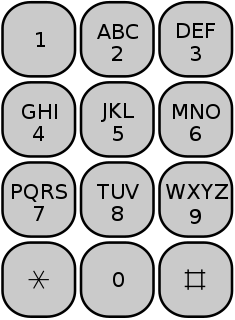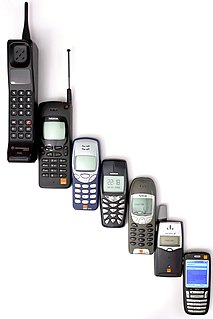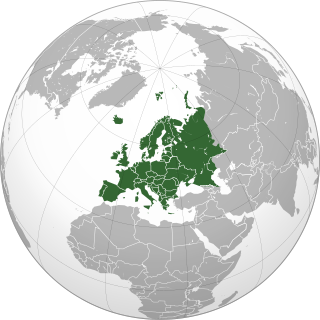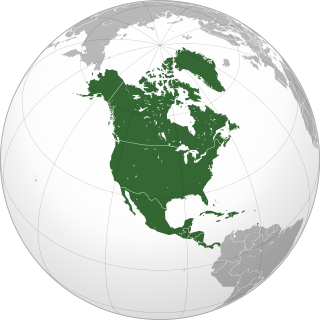
SMS is a text messaging service component of most telephone, internet, and mobile-device systems. It uses standardized communication protocols to enable mobile devices to exchange short text messages. An intermediary service can facilitate a text-to-voice conversion to be sent to landlines. SMS was the most widely used data application at the end of 2010, with an estimated 3.5 billion active users, or about 80% of all mobile subscribers.
A payphone is typically a coin-operated public telephone, often located in a telephone booth or a gang hood, with pre-payment by inserting money or by billing a credit or debit card, or a telephone card. Prepaid calling cards also facilitate establishing a call by first calling the provided toll-free telephone number, entering the card account number and PIN, then the desired connection telephone number. An equipment usage fee may be charged as additional units, minutes or tariff fee to the collect/third-party, debit, credit, telephone or prepaid calling card when used at payphones. By agreement with the landlord, either the phone company pays rent for the location and keeps the revenue, or the landlord pays rent for the phone and shares the revenue.
A SIM lock, simlock, network lock, carrier lock or (master) subsidy lock is a technical restriction built into GSM and CDMA mobile phones by mobile phone manufacturers for use by service providers to restrict the use of these phones to specific countries and/or networks. This is in contrast to a phone that does not impose any SIM restrictions.
Roaming is a wireless telecommunication term typically used with mobile devices. It refers to the mobile phone being used outside the range of its home network and connects to another available cell network.
A fee is the price one pays as remuneration for rights or services. Fees usually allow for overhead, wages, costs, and markup.

Mobile phone spam is a form of spam, directed at the text messaging or other communications services of mobile phones or smartphones. As the popularity of mobile phones surged in the early 2000s, frequent users of text messaging began to see an increase in the number of unsolicited commercial advertisements being sent to their telephones through text messaging. This can be particularly annoying for the recipient because, unlike in email, some recipients may be charged a fee for every message received, including spam. Mobile phone spam is generally less pervasive than email spam, where in 2010 around 90% of email is spam. The amount of mobile spam varies widely from region to region. In North America, mobile spam has steadily increased from 2008 ed 2012, but remains below 1% as of December 2012. In parts of Asia up to 30% of messages were spam in 2012.
A toll-free telephone number or freephone number is a telephone number that is billed for all arriving calls instead of incurring charges to the originating telephone subscriber. For the calling party, a call to a toll-free number from a landline is free of charge.

Fido Solutions Inc. is a Canadian cellular telephone service provider owned by Rogers Communications. Although Fido's parent company, Rogers Communications, also operates another cellular service Rogers Wireless, Fido remains a separate entity and retains its own retail chain, customer service call centres, network servers and CEO. Fido pioneered the concept of providing unlimited service in select Canadian cities. Fido was the first carrier in Canada to launch a GSM-based network and the first wireless service provider in North America to offer General Packet Radio Service (GPRS) on its network.

A prepaid mobile device is a mobile device such as a phone for which credit is purchased in advance of service use. The purchased credit is used to pay for telecommunications services at the point the service is accessed or consumed. If there is no credit, then access is denied by the cellular network/Intelligent Network. Users can top up their credit at any time using a variety of payment mechanisms.
TracFone Wireless, Inc. is a prepaid mobile virtual network operator in the United States, Puerto Rico, and the US Virgin Islands. TracFone Wireless is a subsidiary of Mexico's largest telecommunications company América Móvil, and offers products and services under several other brands. It operates as a mobile virtual network operator (MVNO), holding agreements with the United States' largest wireless network operators to provide service using their networks, including Verizon Wireless, AT&T Mobility, T-Mobile US, Sprint Corporation, and U.S. Cellular. TracFone Wireless had 25.668 million subscribers in 2015.

Prepaid refers to services paid for in advance. Examples include postage stamps, attorneys, tolls, public transit cards like the Greater London Oyster card, pay as you go cell phones, and stored-value cards such as gift cards and preloaded credit cards.
Sprint Canada is a defunct Canadian telecommunications service provider from 1993 to 2005, when it was acquired by Rogers Communications. Sprint offered both residential and business services. It was a key company in the long distance wars of Canada.

Virgin Mobile Canada Ltd.is a provider of postpaid and prepaid wireless voice, text and data communications services throughout Canada. They also offer Home Internet services in select areas of Ontario and Quebec. Launched on March 1, 2005 as a joint venture between Virgin Group and BCE Inc., BCE took sole ownership on July 1, 2009 when it closed a deal to purchase the stake it did not already own. Virgin Mobile calls its customers 'Members' and offers a Member Benefits program, which provides its customers with special offers, discounts, and VIP experiences.
International telephone calls are those made between different countries. These telephone calls are processed by international gateway exchanges (switches). Charges for these calls were high initially but declined greatly during the 20th century due to advances in technology and liberalization. Originally they were placed via long-distance operators. The calls were transmitted by cable, communications satellite, radio, and more recently, fiber optics and Voice over Internet Protocol (VoIP). International direct dialling was introduced in the 1970s, so calls can be dialed by country code without an operator.
A flat fee, also referred to as a flat rate or a linear rate refers to a pricing structure that charges a single fixed fee for a service, regardless of usage. Less commonly, the term may refer to a rate that does not vary with usage or time of use.
1-5-7-1 is the name of a family of calling features in the United Kingdom, for residential and business telephone lines and for mobile telephones, that are provided by BT Group and several other telephone service providers. The family is named after the telephone number 1571, the special service number that is used to access it. Call Minder is the name of BT's highest level of 1571 service.
The postpaid mobile phone is a mobile phone for which service is provided by a prior arrangement with a mobile network operator. The user in this situation is billed after the fact according to their use of mobile services at the end of each month. Typically, the customer's contract specifies a limit or "allowance" of minutes, text messages etc., and the customer will be billed at a flat rate for any usage equal to or less than that allowance. Any usage above that limit incurs extra charges. Theoretically, a user in this situation has no limit on use of mobile services and, as a consequence, unlimited credit. This service is better for people with a secured income.

Koodo Mobile is a Canadian mobile flanker brand started by Telus in 2008 and mostly oriented toward younger customers. Koodo differs from its parent Telus by not requiring a fixed term contract. Koodo currently provides postpaid, prepaid, and wireless home phone services. Being a subsidiary of Telus, Koodo has been able to offer extensive coverage and a strong presence in mobile retailers. This allowed Koodo to gain a presence nationwide.
Mobile donating refers to donating to an organization through a mobile device. The primary means for mobile donating is through SMS. Mobile donating can also refer to consumers donating their old phones to a cause for recycling and reuse of the device.
Google Fi is an MVNO telecommunications service by Google that provides telephone calls, SMS, and mobile broadband using cellular networks and Wi-Fi. Google Fi uses networks operated by Sprint, T-Mobile, U.S. Cellular, and Three.












